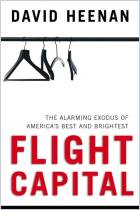加入 getAbstract 阅读摘要

加入 getAbstract 阅读摘要
Vivek Wadhwa
The Immigrant Exodus
Why America Is Losing the Global Race to Capture Entrepreneurial Talent
Wharton Digital Press, 2012
看看什么内容?
Are immigrants a problem for America? Duke University’s Vivek Wadhwa enumerates the flaws of the US visa system and suggests ways to fix them.
Recommendation
In this Economist magazine book of the year, Vivek Wadhwa – entrepreneur, job creator and director of research for Entrepreneurship and Research Commercialization at the Pratt School of Engineering at Duke University – argues that the United States faces a “reverse brain-drain” of crisis proportions. He presents shocking study findings that large numbers of Indian, Chinese and other immigrants leave America after their H-1B skilled worker visas expire. These valuable entrepreneurs and employees return to their home countries for two clear reasons: US visa policy is restrictive and the government refuses to recognize how much these immigrants contribute. Wadhwa draws on his own experience as a child immigrant to make a cogent argument for immediate changes in US policy. While always politically neutral, getAbstract recommends his concise, clear reasoning and accessible writing to entrepreneurs, immigrants, state and federal lawmakers, and anyone who wants to see the US remain a world leader in innovation.
Summary
About the Author
Vivek Wadhwa is director of research for Entrepreneurship and Research Commercialization at the Pratt School of Engineering at Duke University and a fellow at the Rock Center for Corporate Governance at Stanford University. Writer Alex Salkever is a former BusinessWeek.com editor.






















Comment on this summary